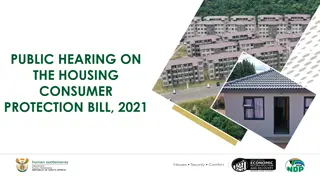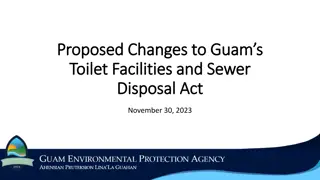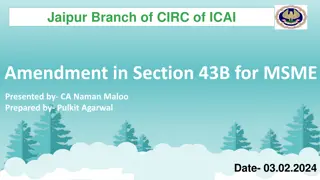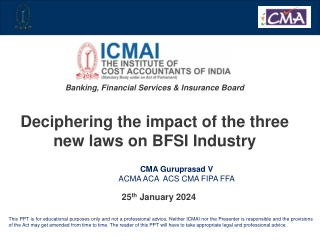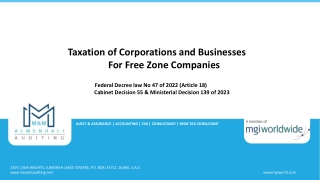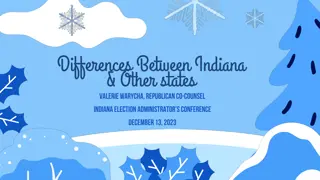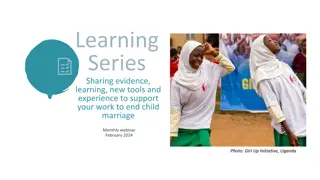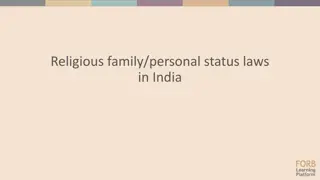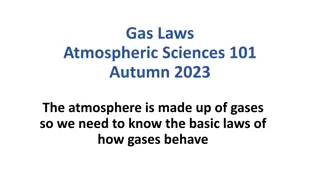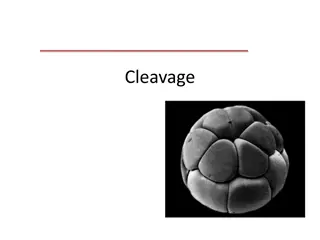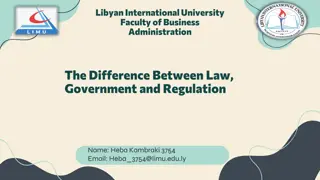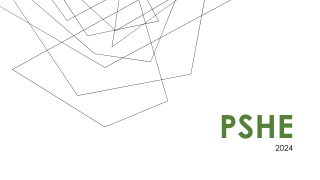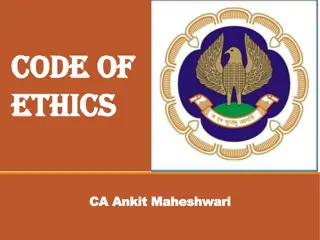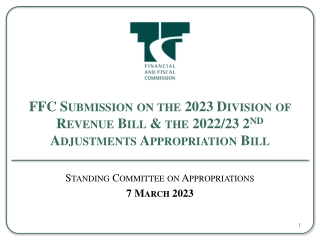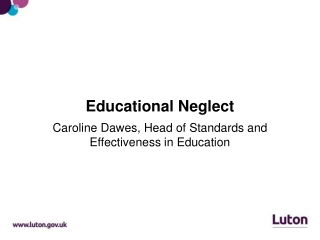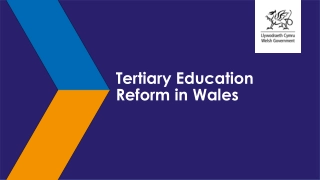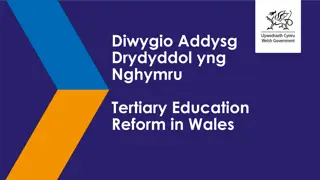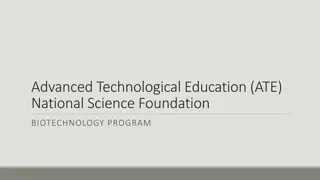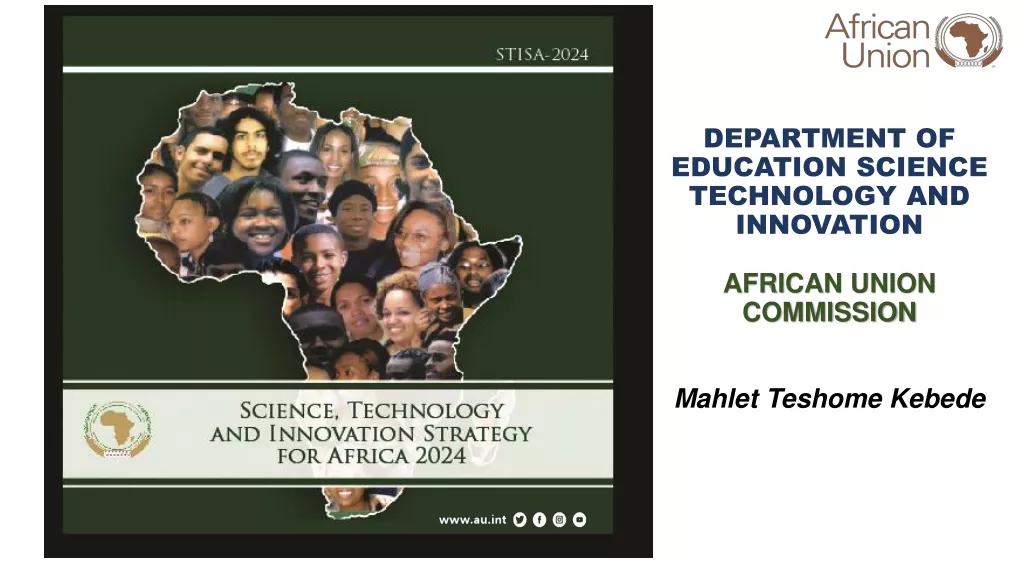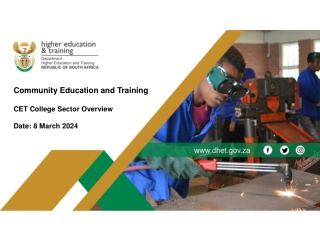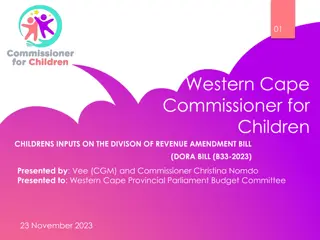Comprehensive Overview of Basic Education Laws Amendment (BELA) Bill B2-2022
The presentation discusses the purpose and intent of the amendments proposed in the BELA Bill B2-2022, addressing challenges to transformation in the education system. It highlights the need for legislative reforms to enhance accountability, improve learner admissions, and empower education authorities. The Bill aims to align South Africa with global treaties promoting education rights, ensuring inclusivity and efficiency in the education sector.
Comprehensive Overview of Basic Education Laws Amendment (BELA) Bill B2-2022
PowerPoint presentation about 'Comprehensive Overview of Basic Education Laws Amendment (BELA) Bill B2-2022'. This presentation describes the topic on The presentation discusses the purpose and intent of the amendments proposed in the BELA Bill B2-2022, addressing challenges to transformation in the education system. It highlights the need for legislative reforms to enhance accountability, improve learner admissions, and empower education authorities. The Bill aims to align South Africa with global treaties promoting education rights, ensuring inclusivity and efficiency in the education sector.. Download this presentation absolutely free.
Presentation Transcript
BASIC EDUCATION LAWS AMENDMENT (BELA) BILL, B2-2022 RESPONSE TO SELECT COMMITTEE HEARING REPORT PRESENTATION
PURPOSE The purpose of the presentation is to: Provide the purpose and intent of the amendments Respond to written and oral submissions Provide clarity on matters not clear in the proposed amendment 2
INTRODUCTION The BELA Bill seeks to amend certain sections of the South African Schools Act, 1996 (Act No. 84 of 1996), and the Employment of Educators Act, 1998 (Act No. 76 of 1998) (the SASA and the EEA, respectively) to respond to administrative challenges facing our schools and to continue with the transformation agenda of our education system in line with the Constitution of the Republic of South Africa and International Treaties 3
CHALLENGES TO TRANSFORMATION Impairment to access to education Lack of integration Religious and cultural intolerance Lack of Human Right Culture Ineffective SGBs Non-compliance to the Constitution 4
SA AS A GLOBAL PLAYER South Africa is a signatory to global treaties that promote Economic, Cultural and Social Right of people. As a member of the UN and Common Wealth that push for the right of the child, South Africa is obliged to meet certain standards to make education compulsory and free. The African Charter for the Rights and welfare of the child declared in 1986 also drives the country to develop laws that put the child first, leave no child behind as it makes education compulsory. The BELA is the country's response to these treaties. At its core, the Bill reflects South Africa's aspiration for a more inclusive, equitable and efficient basic education system. It addresses key challenges that have, for years, hindered the progress of our education ecosystem. 5
TO CREATE CERTAINTY & CURE MISCHIEF IN THE EDUCATION LANDSCAPE LEGISLATIVE REFORMS Implementation of court judgments that protect and give effect to the Bill of Rights 1 Provide for financial and public accountability frameworks for governing bodies and provincial departments 2 System improvements in terms of learner admissions 3 Provide for additional Regulatory powers of Minister, and enhancing decision making and oversight powers of HOD s and MEC s RATIONALE 4 For technical and substantive adjustments, clarify certain existing provisions, insert provisions which are not provided for in existing legislation and strengthen enforcement mechanisms for offences and penalties 5 6
LIMITATION The BELA Bill seeks to amend certain sections of the South African Schools Act of 1986 to respond to administrative challenges facing our schools and to continue with the transformation agenda of our education system. It is not a whole-sale Bill that covers all aspects of the sector. It focuses mainly on the administrative processes of the department and schools. It would therefore not include: Early Childhood Development Human resources no appointment of teachers and general workers Infrastructure no sanitation, pit latrines, mobile classrooms, building of schools, water & electricity supply or such. These are covered in the Norms and Standards for School Infrastructure Inclusive Education and schools for Learners with Special Needs which are covered in White Paper 6 Curriculum aspects, so there will be no mention of subjects, 3 stream model, online schools, assessment, Life Orientation which includes sexuality education. Extra-curriculum and sports Other government challenges 7
OBSERVATIONS Comments not based on clauses in the Bill Divisions along racial, religious, political, socio status lines Negative mobilisation during hearing and submissions of scripted comments Misinformation Attempts to change the primary Act 8
DEFINITION OF CORPORAL PUNISHMENT COMMENT RECOMMENDATIONS It is recommended that the definition of corporal punishment be widened to include non-physical forms of punishment as defined by the UNCR, that have the potential to inflict fear and/or infringe upon the right of the child to human dignity. Accepted Therefore, the Definitions Recommendation was as follows: To include subsection (d) as follows under the definition: corporal punishment means any deliberate act against a child that inflicts pain, fear or physical discomfort, to punish or contain the child, which includes, but is not limited to (d) any other act that seeks to belittle, humiliate, threaten, induce fear or ridicule. 9
COMPETENT ASSESSOR COMMENT RECOMMENDATIONS It was opined that educators in South Africa are trained only according to the CAPS model of assessment and will not be able to assess a child s home school modules and curricula. Being exposed to a CAPS assessor will defy the purpose of assessment and discourage children. competent assessor means an educator registered with the South African Council for Educators as defined in the South African Council for Educators Act, 2000 (Act No. 31 of 2000), or a person or body registered with the South African Qualifications Authority as defined in the National Qualifications Framework Act, 2008 (Act No. 67 of 2008); It is incorrect that SA educators are trained in CAPS An assessor is appointed by a parent who is home schooling the child in the curriculum of the parent s choice according to the criteria set out by the parent The registration is not with the service provider but with SACE or SAQA The definition allows for a recognised professional body in the field of education to be a competent assessor. There is no need to amend the definition The competent assessor according to the given definition will not understand the goals and model of working. It would be a fruitless, unaffordable and disheartening exercise. It is recommended that the definition of a competent assessor includes training and experience in the variety of home education approaches such as Waldorf, Classical, Eclectic, Montessori, Unschooling etc. . It is suggested that Competent Assessor be defined as a person or body registered with the provider of a curriculum used by the learner, a registered professional capable of performing academic assessment independent of curriculum, or a standardized testing service provider including online testing. Amend Section S51(2)(b)(iii). 10
HOME EDUCATION OBJECTIONS RECOMMENDATIONS The inclusion of requirements with reference to Section 51(2)(a)(iii) of the South African Schools Act 1996 which mentions that the proposed home education programme is suitable for the learner s age, grade level and ability and predominantly covers the acquisition of content and skills at least comparable to the relevant national curriculum determined by the Minister and Section 51(2)(b)(iii) arrange for the learner s educational attainment to be assessed by a competent assessor . The definition does not refer to specific curriculum nor limit home schooling to CAPS curriculum. It refers to a curriculum comparable to national curriculum determined by the Minister. Grandparents, guardians, caregivers are covered in the definition: education provided under the direction of the learner s parent, primarily in the environment of the learner s home . This definition will limit home schooling to the CAPS curricula and the limited provision of the Minister which will not serve in the best interest of my children It is recommended that the definition of home education should rather include a child lead process; not limited to the home; requirements related to the specific curricula of choice for each child; arranging for the learner s educational attainment to be assessed according to the requirements of the specific curricula which may include the parent or an external assessor . It is recommended that there be an expansion of this definition to include grandparent, relative, guardian and care giver teaching and home schooling itself should be included and clearly defined based on consultation with the home-schooling sector. 11
INCLUSIVE EDUCATION I COMMENT RESPONSES There was a submission proposing that Inclusive Education be added to the definitions to ensure the proper regulation of inclusive education for purposes of ensuring a synchronized educational system that equally responds to all learners. Currently the Act excludes Inclusive Education, which results in it being regulated by separate policies and does not receive the necessary attention. The Bill already defines special education needs means education designed to facilitate the learning of individuals who, for a wide variety of reasons, require additional support and adaptive pedagogical methods in order to participate and meet learning objectives in an educational programme. Inclusive Education is regulated separately so that it can receive dedicated attention. 12
MICRO SCHOOLS I COMMENT RESPONSES There were suggestions that under Section 1 of the South African Schools Act, 1996, is hereby amended by the insertion in subsection (1) after the definition of home education of the following definition: The definition of Independent Micro-Schools could not be added because Micro-Schools do not feature in the Bill itself. The department and the relevant stakeholders will have to commence with discussions around this area of schooling to formalise it. Independent micro-school means an independent school of 135 learners or less registered or deemed to be registered in terms of section 46. 13
GRADE R COMMENT RECOMMENDATIONS Participants submitted that not every child develops at the same pace and therefore it is not in the best interest of every child to start attending school during the year in which the child reaches the age of six. It is catered for in the compulsory school going age, which is 7 years In terms of Section 7 of the Children s Act 38 of 2005, (1) Whenever a provision of this Act requires the best interests of the child standard to be applied, the following factors must be taken into consideration where relevant, namely (g) the child's age, maturity and stage of development; gender; background; and any other relevant characteristics. (h) the child's physical and emotional security and his or her intellectual, emotional, social and cultural development and (i) any disability that a child may have; (j) any chronic illness from which a child may suffer. These have been considered and aligned 14
GRADE R COMMENT RESPONSES There was a submission that Section 3(2) of the schools Act be amended to eradicate the bifurcated prescription for compulsory schooling and encapsulate the prescripts of inclusive education, thereby extending compulsory schooling for children living with disabilities, considering that scores of such children do not start school within the prescribed ages for compulsory schooling Age is not a consideration for learners with special needs It is recommended that governmental programs need to be developed to equip parents to facilitate school readiness. It was pointed that the best interest of the child standard is paramount in making decisions pertaining to children with reference to making law. There are ECD programme running in the sector Submitter stated that the financial implication of R5.26 billon will be required in terms of the provision for Grade R, R12 billion is required to address the shortfall in classrooms. A concern raised on how the DBE can prioritize compulsory Gr R given existing problems such as safety and sanitary conditions at schools, shortfall of teachers and schools. The department will not be using funds allocated to infrastructure development or other programmes. Grade R funding will be allocated by Treasury through equitable shares, ring fenced for such a programme Allowing children to access education early is our biggest priority if the country have to adequately prepare children accordingly. Developed country start as early as the age of three 15
LEARNER ATTENDANCE COMMENTS RECOMMENDATIONS Subsection (4) must be expanded to make provision for the principal or his delegate to within 24 hours or any reasonable time thereafter , as the 24 hours may not fall on a working day and must be extended. Submission accepted that the 24hour might fall on a weekend or public holiday. The 24hour will be defined to mean 24hour as per school calendar. 16
ADMISSION POLICY OBJECTIONS RESPONSE The majority of submitters who objected to Clause 4 Section 5 was because of the amendment that states that the SGB must submit to the HOD for approval of the admission policy of the school and any amendment thereof. The need for submission can be reviewed The HOD is the custodian of admissions in schools 5. (1) A public school must admit learners and serve their educational requirements without unfairly discriminating in any way. (2) The governing body of a public school may not administer any test related to the admission of a learner to a public school, or direct or authorise the principal of the school or any other person to administer such test. (3) No learner may be refused admission to a public school on the grounds that his or her parent- (a) is unable to pay or has not paid the school fees determined by the governing body under section 39; (b) does not subscribe to the mission statement of the school; or (5) Subject to this Act and any applicable provincial law, the admission policy of a public school is determined by the governing body of such school. (7) An application for the admission of a learner to a public school must be made to the education department in a manner determined by the Head of Department. (8) If an application in terms of subsection (7) is refused, the Head of Department must inform the parent in writing of such refusal and the reason therefor. (9) Any learner or parent of a learner who has been refused admission to a public school may appeal against the decision to the Member of the Executive Council. The requirement of the HOD s approval of the school s admission policy conflicts with the scheme of the Schools Act which envisages a cooperative partnership between the SGB and the HOD. With just under 24 000 public schools, and with provinces struggling to deliver on existing legislative obligations, there are concerns on how they will be able to deal with and respond to all the submitted policies. There are concerns that the promulgation of BELA, insofar as it relates to sections 5 of the Schools Act, will lead to undesirable consequences which include: a) excessive dominance by the national and provincial education departments, thereby undermining the grassroots democracy model for school governance under the Schools Act, despite the Constitutional Court s warning against such dominance in previous litigation. b) an adverse impact on quality education achieved through the tri-partite partnership model. c) permanent alienation of a significant portion of school and language communities; and d) an exodus from the public school system to private institutions. 17
LANGUAGE POLICY OBJECTIONS RECOMMENDATIONS One of the reasons for amending the SASA is to align it to recent court decisions and to ensure that due process is followed in any decision taken by the HOD. It must be emphasized that an SGB still has the power to determine the admission policy. The HOD may only disapprove a policy if he follows the steps as set out in the Act. The SGB cannot be the player and referee on its own policy. The majority of the rejections in Clause 5 was with regards to sections 6 of the South African Schools Act, which respectively regulate the admission and language policies of public schools. It was reported that the proposed amendments appear to conflict with pronouncements of the Constitutional Court in respect of the fundamental governance structure under the Schools Act, and the recognition of the school governing body (SGB) as: a) a democratic institution. b) an extension of the community that it serves; and c) a body clothed with the power to make rules and policies, which is integral to the governance of a specific School with its unique circumstances. In the Rivonia judgment, on appeal to the Constitutional Court, the majority of the Court, concluded that the HOD had the power to admit the learner. It held that the school governing body may, in terms of the Schools Act, determine capacity as part of its admissions policy. However, this power is subject to other provisions of the Schools Act, which states that the Department maintains ultimate control over the implementation of the admission decisions. Further, the provincial Regulations afford the HOD the specific power to overturn a principal s rejection of a learner s application for admission. Moreover, the Court held that the capacity determination as set out in the schools admission policy could not inflexibly limit the discretion of the HOD. It was suggested that there must be some mandatory obligation towards the head of department to ensure that the steps taken are in fact executed and that the language change will only be affected after such steps have been taken. The absence of these steps being executed will and can result in huge financial implications to the community and parents at the school. 18
CODE OF CONDUCT COMMENT RECOMMENDATIONS The majority of submitters who objected to this amendment opined that the proposed amendment to Section 8 of the Schools Act as set out in Section 7 of the Bela Act, specifically stating that the code of conduct must contain an exemption provision in terms of which a learner, or the parent of a learner, may apply to the governing body for exemption is unacceptable. The clause should remain the same. Just Cause cannot be defined as this is an object test. You cannot define objectivity as it depends on circumstances. Religious, cultural or medical grounds can be added after the word just cause as examples "Just cause" is simply too wide and may lead to frivolous applications for exemption. It means that governing bodies must meet to consider and deliberate on all these applications, react to them in a reasoned manner, and come to a rational decision. "Just cause" should be replaced by "religious, cultural or medical grounds. 19
SUSPENSION AND EXPULSION OF LEARNERS COMMENT RESPONSE The proposed amendment to Section 9 of the Supported Schools Act states that a suspension may only be enforced after a learner has been granted a reasonable opportunity to make representations. The submitters opined that the list of serious misconduct offences as defined in the Act, lists certain acts of misconduct that would justify immediate suspension. It was therefore suggested that the Act be expanded to make provision for a temporary suspension for certain acts until a formal hearing can take place. There was a request for clarity to be provided on what constitutes an act of serious misconduct by 20 learners.
SEARCH AND SEIZURE COMMENT RESPONSE The clause is not restrictive. The principals are not confined in taking the confiscated objects to the Police station. The principal may choose to keep the object at school premisses and request SAPS to collect same. The majority of submissions indicated that the proposed amendment to Section 8(d) is unacceptable as the onus on the principal is reckless and severe. A principal or any other person for that matter is not allowed to drive around with a dangerous object or illegal drug under any circumstances. Therefore, it would be prudent to state that the principal secures it on the premises and awaits the SAPD to collect the same. 21
CENTRAL PROCUREMENT OBJECTIONS RESPONSE Majority of submissions objected to the proposed Section 21(3A) of the Bela Bill proposes amending Section 21 of the SASA by introducing a provision which enables the HOD to centrally procure identified learning and teaching support material for public schools , notwithstanding that this function may have been allocated to an SGB pursuant to Section 21 of the SASA, and without Section 22 (which addresses the procedure for withdrawing a function from an SGB) applying. Central procurement can only be implemented by the Head of Department in consultation with the governing body.The term in consultation means with the concurrence of the person with whom a delegating authority must consult before exercising a delegated or sub- delegated power. This means that the HOD is required to consult before arriving at a decision and arrives at the decision after securing the agreement or consent of the person so consulted. Should an HOD proceed to centrally procure without the concurrence or consent or agreement of the SGB he or she will be acting ulra vires or outside the four corners of the law. It does not take away the powers of the SGBs. There are examples of producing work books and textbooks supply in Limpopo which prove that there are benefits when the Department approaches publishers directly to maximise on benefit of economies of scale Concern Raised The implications of this amendment will be that the Department will centrally procure LTSM for schools. Given certain provincial departments incapability to deliver books to schools, there is concern that the provincial departments will not have the capacity to deliver quality material on time. 22
DISSOLUTION OF SGB COMMENTS RESPONSE The submitters main concern with regards to this proposed amendment is the power granted to the temporary or interim SGB in section 25(2). The primary Act has not been amended: 25. (1) If a governing body has ceased to perform its functions, the Head of Department must appoint sufficient persons to perform those functions for a period not exceeding three months. (2) The Head of Department may extend the period referred to in subsection (1), by further periods not exceeding three months each, but the total period may not exceed one year. (3) The Head of Department must ensure that a governing body is elected in terms of this Act within a year after the appointment of persons contemplated in subsection (1). The main concern with regards to these proposed amendments are the power granted to the temporary or interim governing body in the proposed section 25(2). The power granted to the temporary or interim governing body appears to be more extensive than intended, as it grants the temporary or interim governing body exclusive voting rights and decision- making powers on any function that they have been appointed to perform. 23
CHAIRPERSON OF FINANCE COMMITTEE COMMENT RECOMMENDATIONS Most submitters objected against the amendment and indicated that it should, not only when reasonably practical, but always be a parent member, as the decisions made by the chairperson of a finance committee have a huge financial impact on the school and should not be left in the hands of an educator. There are instances where parents are unable to perform this task hence the use of where reasonable practical 24
CLOSURE OF PUBLIC SCHOOLS OBJECTIONS RECOMMENDATIONS The proposed amendment to close down smaller schools will likely increase the distance that many learners must travel to reach school and result in an increase in the cost of transport for parents sending their children to schools further away from home. The proposed amendment, as submitters state, may even result in children not attending school at all due to the distance they are required to travel. Such smaller schools, home and private schools are normally better run, better disciplined, and produce better results, the submitters suggest. Submitters objected to the Clause in the light of a shortage of school facilities and the failure of the government to provide adequate sanitation at rural schools. It is recommended that instead of closing small schools and spending billions to implement Grade R, rather allow micro- and cottage schools to operate. The determinations to merge and close smaller schools by the Department are provided for in section 12 of the primary Act which is not amended. The Bill sets to ensure that before a school is closed, proper processes and procedures must be followed making sure that the closure of such schools will not be to the detriment of the learners. The Bill lays down conditions to be considered before a decision to close is taken. The closure of non-viable schools is not related to the introduction of Grade R. 25
LOAN OR LEASE AGREEMENT OBJECTIONS RECOMMENDATIONS Most submitters objected against the proposed amendment to Section 36 whereby the proposal that no school may enter into a loan or lease agreement without the written consent of the member of the executive council, as completely impractical. That is to ensure that SGB do not over commit during their term of office. It is suggested that for practical purposes, permission should be granted for certain loans or leases and a limitation on an amount may be suggested. 26
FUNDS FOR PUBLIC SCHOOLS COMMENT RECOMMENDATIONS The submitters propose that section 37(1) be amended to allow the Minister, and not the HOD, to determine the directions under which an SGB must establish and administer its school funds in accordance with the Schools Act. The replacement of HOD by Minister has not been contested in comment provided It is suggested that the Department review its funding model for schools (this includes the quintiles, funding model for schools and the fee exemption tables), as well as its current staffing model. The current models inherently have, as a point of departure, that all schools are single-medium institutions. 27
DEVIATION OF BUDGET OBJECTIONS RECOMMENDATIONS Most submitters objected to Clause 38(b) which proposed that "If a governing body finds it necessary to deviate from the initial budget that has been approved as contemplated in Subsection 2, and the deviation will be 10% or more of the initial budget or reallocate funds for use for a purpose different to that which was approved by the parents " then a general meeting of parents must be convened. It should be noted that the SGB functions as representatives of parents. Their operations depends on the mandate they receive from parents. They may not simply change the mandate from approval They opined that this will unnecessarily encumber the SGB to make necessary and possibly urgent payments and/or to reallocate funds for different purposes. Such measurements are deemed completely impractical as a governing body will be in no position to manage a school's finances effectively. 28
SUBMISSION OF FINANCIALS BY GOVERNING BODY OBJECTIONS RECOMMENDATIONS Many submitters objected to the proposed amendment of Section 43 of Act 84 of 1996, as amended by Section 10 of Act 31 of 2007 refers. They indicated that the burden which is placed on a governing body to submit quarterly financial statements is onerous and impractical on the governing body and in any event will encumber the already heavily burdened bureaucracy as well. It is suggested that the status quo of submission of annual statements be maintained. The amendment seeks to create certainty with regard to reporting and to promote open and transparent accounting and financial accountability, bearing in mind that public funds and parents money are at stake. Currently, fraud and misappropriation of funds are only detected when the audited annual report is submitted. By then it is too late to intervene. This amendment will assist the HOD to act on time on any financial misconduct committed by SGB s. Having these quarterly reports, the HOD may immediately find ways to mitigate the risk of financial misconduct. Moreover, the quarterly financial statements/reports that are now required are not audited reports therefore there will be no financial implications incurred by the schools. Only the annual report needs to be audited. 29
SUBSIDY GRANTED TO AN INDEPENDENT SCHOOL OBJECTIONS RECOMMENDATIONS Most of the submitters objected the proposed amendment of Clause 34 because they believe that the submission of quarterly reports, apart from the annual audited financial statements, that a governing body would have to submit will place a financial and administrative burden on the governing body and the school s resources. See comment above Concern raised The additional administrative burden is placed on the school, and there s a concern that educators will have to withdraw from classes to attend to these proposed reports. 30
HOME EDUCATION OBJECTIONS The majority of submissions that objected against Clause 35 Section 51, were in Subsections 1,2,4,6, and 12 and stated that these sections do not respect parental rights. It was also indicated that Subsections 2(a)(iii) and 2(b)(iii) place unlawful limits on the curriculum and assessment methods that home educators make use of. It was further indicated that Subsection 16 provides the minister unlawful broad powers to make regulations without consultation with the home Educator community. The submitters stated that the Bill does not make any provision for online schooling and micro-independent schools. RECOMMENDATIONS Clause 35 seeks to substitute section 51 of the SASA to provide clarity in regard to home education. The amendment (read with the amendments to section 3 of the SASA) makes it clear that learners may be educated at home only if they are registered for such education. The Constitution of South Africa and the South African Schools Act (SASA) allows for two types of schools: Public schools and independent schools. Independent schools provide parents with added choice with regards to the schooling of their children and also provide a service to their learners that would otherwise have been borne by the State. Section 29(3) Everyone has the right to establish and maintain, at their own expense, independent educational institutions that are registered with the state and maintain standards that are not inferior to standards at comparable public educational institutions . Other submitters rejected Clause 35 because it allows a Provincial Education Department to set aside the decisions of parents by giving the power to HODs to decline applications for home education. They indicated that It is the parents' and guardians' constitutional rights according to the international treaties South Africa is party to, to make the best choices for the upbringing and development of their children. Therefore, the HOD cannot be given the power to set aside the decision of the parent to home-educate their children. Clause 35 unlawfully restricts the right to education to only that which covers skills and content comparable to the national curriculum, and outlaws education of a similar or higher standard that covers different skills and content. 31
LEARNER PREGNANCY OBJECTIONS RECOMMENDATIONS Some of the objection to Clause 39 was that it is too vague and that allowing an Educator to get involved in the medical care of learners will lead to misused authority. The implication that comprehensive sexual education will be implemented is a concern as it goes against the principles of most religions in the country. There were submissions that rejected this clause as they stated that (1) Rape cases will rise in schools, (2) Teenage pregnancy will become out of control and skyrocket in schools and communities, and (3) their culture will be tempered with as a society and nation. Many submitters submitting under the umbrella of the African Christian Democratic Party (ACDP) which state the urgency and gravity of the learner pregnancy crisis in South Africa. It is in their view that the current policies and the approach of the Department of Basic Education (DBE) are not only failing but are exacerbating the situation. Clause 39 seeks to amend section 61 of the SASA to extend the powers of the Minister to make regulations on the management of learner pregnancy; on the admission of learners to public schools; on the prohibition of the payment of unauthorised remuneration or the giving of other financial benefits or benefits in kind to employees; on minimum norms and standards for provincial teacher development institutes and district teacher development centres; on the organisation, roles, and responsibilities of education districts; and a national education information system. It does not cover curriculum issues such as sexuality education or other Acts by other departments such as the termination of pregnancy stipulations by Health 32
LEARNER PREGNANCY OBJECTIONS RECOMMENDATIONS It is recommended that learners must be taught not to hide information from their parents and that any education of sexual content should first get the buy-in from parents Comprehensive Legislative Reform: The ACDP calls for the introduction of a new section in the BELA Bill, dedicated to addressing learner pregnancy through laws reflecting the principles proposed in this submission. Focusing on Family and Community: it was proposed that a shift in focus towards strengthening the family unit and community involvement as crucial pillars in preventing and managing learner pregnancy. Conscience Protection in Education: The inclusion of wide conscience protection clauses in the BELA Bill are essential to ensure that educators and school staff are not compelled to act against their moral and ethical beliefs. Diverse and Localized Approaches: Acknowledging South Africa s diversity, the ACDP recommends that provinces develop tailored laws and regulations to address their unique challenges related to learner pregnancy. Targeting the Root Causes: Policies should focus on the male impregnators, holding them accountable and addressing statutory rape and gender-based violence through specialized units and legal measures. Support for Pregnant Girls and Their Children: Ensuring that pregnant girls and their children receive adequate support, care, and alternative educational opportunities is crucial. Creating Safe Environments: Education is not enough; safe environments must be created for girls. Promoting Positive Values: The ACDP advocates for the promotion of values such as monogamy and responsible behaviour among the youth. The recommendation by the ACDP are steps that are taken in the development of any Regulation. The objection to place the development of the Regulation on the agenda and call for public participation defeats the purpose as recommended by the ACDP 33
REIMBURSEMENT OF SGB MEMBERS COMMENT RECOMMENDATIONS The BELA Bill supports reimbursement of SGB members for reasonable expenses incurred. About paragraph 21 of the BELA Act referring to the proposed amendment of Section 27, the majority of submitters indicated that members of the governing body should be reimbursed for reasonable expenses incurred for the attendance of meetings and school activities. Per the current amendment, it is stated that there may be no remuneration, but reference must be made to the reimbursement of expenses incurred by members, in the fulfillment of their duties. 34
CONDUCTING BUSINESS WITH STATE COMMENT RECOMMENDATIONS Proposal is that this provision should be confined to State employees not Educators. Teachers are state employees. They are allowed to run any business or do extra work for remuneration outside schools The Clause states the Educator may not which is a discretionary provision until such business is disclosed and approved by the Department. after declaration but may not do business with the state. 35
BASIC EDUCATION LAWS AMENDMENT (BELA) BILL, B2-2022 ORAL SUBMISSIONS
AfriForum QUESTIONS RESPONSES What is the rational of the DBE for more regulations via the BELA Bill instead of less regulation to realise a decentralized model specifically in terms of increasing the formal participation of communities in public schools? There are currently 3 new regulations in the Bill. These are matters that cannot be regulated on a provincial level. We need national regulations to bring about uniformity, especially on SGB matters. Why are various sections of the BELA Bill formulated in such a manner that oral and written submissions emphasized that such are vague? Specifically, that it does not lead to a common understanding and/or leaves such stipulations open to potential abuse? There are no vague provisions in the BELA Bill. There is a difference between stipulations in an Act and regulations or guidelines. The Act is concise and gets its expression in regulations and guidelines Why is the BELA Bill formulated in a manner which can be interpreted to be a direct attack on Afrikaans as a language, specifically within the academic context of South Africa? The BELA Bill is formulated to ensure that there is equal treatment of all languages spoken in a community and to bring about mother tongue instruction to the children of the country in schools serving such communities 37
Independent Schools Association of Southern Africa (ISASA) QUESTIONS RESPONSES Why does the definition of corporal punishment in the BELA Bill not include non-physical forms of punishment? The Bill does refer to corporal punishment as a deliberate act that inflicts pain which can be emotional, physical or psychological. Is it feasible to make the starting age for schooling flexible to accommodate gifted learners to start school at a younger age, especially in the independent school context? Section 5(4)(b), (c) and (d) of the SASA already caters for the admission of gifted learners. Why is there the perception that no procedural process and/or opportunity exists for independent representations to the HOD in sections relevant to independent schools? There is no need for representation, the bill is criminalising illegal independents schools. Clause 34 replaces Minister with MEC on subsidies. The rest of section 38 on the representation of independent schools remains unchanged. The Head of Department may not terminate or reduce a subsidy unless- (a) the owner of such independent school has been furnished with a notice of intention to terminate or reduce the subsidy and the reasons thereof; (b) such owner has been granted an opportunity to make written representations as to why the subsidy should not be terminated or reduced; and (5) The owner of an independent school may appeal against the termination or reduction of a subsidy to such independent school. schools to make 38
Independent Schools Association of Southern Africa (ISASA) QUESTIONS RESPONSES Why does ISASA find it challenging to access information linked to subsidies for independent schools? This is an operational matter What would be the benefit achievable from having schools report more than once a year? Why is such benefits not achievable from an annual report? The amendment seeks to create certainty with regard to reporting and to promote open and transparent accounting and financial accountability, bearing in mind that public funds and parents money are at stake. Currently, fraud and misappropriation of funds are only detected when the audited annual report is submitted. By then it is too late for any intervention. 39
SAOU QUESTIONS RESPONSES Does the state wish to retain SGBs as a valuable and trusted partner? Yes. There is no suggestion in the Bill to the contrary. Does the state wish to revert to a state school model, or does it wish to retain a public-school model? retain a public-school model? The existing wording/stipulations linked to Section 5 and 6 of the BELA Bill has passed constitutional scrutiny. Can the DBE confirm without doubt that the Amended Section 5 and Section 6 in the BELA Bill will pass constitutional scrutiny? Yes the Bill has been vetted by the Chief State Law Advisors (OCSLA) and the Bill was found to be Constitutional compliant. How will the DBE guarantee that the proposed central procurement in the BELA Bill will not lead to the creation of tenderpreneurship ? The key sentence in the central procurement clause is in consultation with the SGB to benefit from economic of scale Why are greater autonomy not being considered for well-functioning schools who have a clean audit and comply with academic and financial performance standards? Well functioning schools do have autonomy in managing curriculum and setting own question paper, including the utilisation of funds as schools with section 21 function but that does not exempt them from financial accountability 40
Concerned Young People of South Africa QUESTIONS RESPONSES How will the DBE fund compulsory education from Grade R noting the financial struggles currently experienced in offering all learners a quality education in a safe and hygienic environment? Education is funded through equitable share by Treasury. Before funding is made available, there must a be law first. How are parents/guardians being accommodated who keep their learners at home directly due to religious beliefs and morals based conscientious objection, specifically in the context of a 12-month prison sentence? As long as children kept at home are receiving education and are registered, there will be no problem. It will be a challenge to keep children at home on religious believes without any form of education. Every child has a basic right to education Why do submissions highlight that the wording parents is used exclusively, potentially excluding guardians such as grandparents and others? The definition of parent in the BELA Bill extends to guardians, grand parents and others, such as child headed households. How is the DBE to determine whether home schooling is in the best interest of a child and how will the DBE deal with a dispute from a parent who disagrees with the DBE s determination? It has always been compulsory for a parent to register a child for home education with the department in terms of section 51 of the SASA. The department will determine from the information obtained, amongst others, from the registration process whether it is in the best interest of the child to be taught at home or not. The Bill contains deadlock breaking mechanisms in cases of objections. 41
Concerned Young People of South Africa QUESTIONS RESPONSES What research is the DBE relying on to decide on whether home schooling is in the best interest of a child? The report from a qualified, registered independent assessors will make the department make such a determination Since 2015, what process has the DBE pursued to ensure that home education research in a South African context is conducted? Very little research as the department focuses on the millions of learners in its care as compared to those whose education is sufficiently covered by their parents. Why are small schools being closed, specifically noting the need for employment opportunities in rural areas, the desire for families to stay together, and to reduce the need to travel far distances to attend formal schooling? [How is the District Development Model considering retaining small schools to enhance the economic potential of a rural area?] The closure and merger of school does not lead to retrenchment of staff. Small schools are close when they are non-viable. When it is not possible for the school to teach all subjects with the required allocated time. The DDM can assist in the repurposing of disused schools for community needs. How will the suitability of study material be established in a centralized procurement system, especially noting curriculum content linked to sexually explicit themes and removing powers from SGBs? Centralise procurement does not take away the powers of the SGB. The Bill states that it will be done in consultation with SGBs. It should be noted that only approved LTSM can be purchased. Sexual explicit materials cannot be approved as part of learning materials. 42
Western Cape Forum for Intellectual Disability QUESTIONS RESPONSES Why is the Bill formulated in a manner causing the perception that it encourages silent exclusion of learners with disabilities at a public school, particularly, those who attend special care centres? Noting that special care centres exist because of silent exclusion, leaving learners with disabilities with no choice but to attend such centres. The Bill does not cover aspects of learners with special needs because those are sufficiently covered in White paper 6 Why is the BELA Bill perceived by some as a missed opportunity to legislate and resource/fund inclusive education (including education for children with disabilities)? Refer to the response above How can the DBE take advantage of this opportunity to legislate and resource/fund inclusive education (including education for children with disabilities) specifically in terms of special care centres potentially becoming part of the public schooling system? There are norms and standard for the funding of special schools that are being developed and consulted with stake holders. What is the status of the level 5 qualification for caregivers in special centres as being developed/delivered as a partnership between DBE and UCT? Teacher qualifications are determined by DHET 43
FEDSAS QUESTIONS RESPONSES How is the BELA Bill promoting Cooperative Governance, specifically noting the context of removing powers from SGBs? No power of SGB has been taken away. Accountability has been added to the SGB s role in determining admission and language policies to give effect to section 6 (2) and (3)of SASA The governing body of a public school may determine the language policy of the school subject to the Constitution, this Act and any applicable provincial law. (3) No form of racial discrimination may be practised in implementing policy determined under this section. This is the role the HOD to ensure compliance to these provisions Why have the submissions noting to maintain Section 5 and 6 as stipulated in the SASA during previous public involvement engagements been ignored or rejected? Only the requirement to submit policies within a specified periods of time were agreed upon during previous engagement. The Department is still committed to that should the NCOP approve. 44
FEDSAS QUESTIONS RESPONSES Why are there not clear guidelines to assist and guide a school to determine its capacity in terms of learner enrolment numbers instead of the focus on admission and language policies? The two are unrelated because the equal treatment of languages available in the community and the admission of learners will still be subjected to the norms and standard of infrastructure which determines class size and curriculum determination of 1/35 and 1/40 in non specialised subject. Guidelines on school capacity are being drafted and will soon be available for consultation with stakeholders and later open for public comments Why are schools not being allowed to voluntarily opt into the process of central procurement instead of enforcing such onto all public schools? The clause on central procurement is a warning to the department in line with the Eastern cape Court judgement, hence the emphasis on in consultation with the SGB . It therefore makes it a voluntary process because section 21 functions have not been amended. School will continue to be funded as before as the court has ruled. Where negotiated cheaper prices are made available to schools, consultation will commence to ensure that schools benefit from economies of scale. Why are annual reports inadequate and how will the submission of quarterly reports overcome this identified inadequacy of annual reports? Annual reports are inadequate in terms of delay in detecting financial irregularities in real time for immediate intervention. 45
South African Education Development Trust (SAAOT) QUESTIONS RESPONSES How is the DBE planning to enhance the capacity of provincial education departments and schools to implement the proposed amendments? How can the DBE guarantee readiness of all to implement and resource the BELA Bill s proposed amendments? The resourcing of the Bill s proposal depends on the Bill becoming Law to unlock funding from Treasury through equitable shares. No budget can be made available prior to that. The passed Law has to be mediated to all officials, stakeholders, including members of the public on matters that involve them. How has the DBE ensured that an economic feasibility study was conducted concerning the implementation and additional costs linked to the BELA Bill Amendments? The Bill has been costed by the Department of Planning, Monitoring and Evaluation and National Treasury has approved the costing implications associated with the Bill. How is the DBE going to increase the trust that citizens have in government by focusing on ensuring that all schools have basic facilities such as clean, running water, flushing toilets, safe school buildings or enough and adequately trained educators and staff members, instead of redirecting funds to specific amendments as stipulated in the BELA Bill? The programme to provide infrastructure and sanitation is on going with its own budget so is teacher development programmes with DHET and internal programmes with separate budgets too. The funding of the approved amendments will be done by Treasury, announced by the Minister of Finance when the law is in place. 46
ActionSA QUESTIONS RESPONSES Why is the definition of Basic Education formulated in such a manner that it is perceived as being inadequate and in need of further amendment? The definition is adequate as it unless Action SA has suggestions which is the reason why there is public consultation. Why is the Bill perceived by some as being unclear in terms of linkages between the Grade R curriculum and the remaining curriculum of the school? We request clarity on the question because Grade R with its curriculum has been offered in schools, community centres, ECD centres and private establishments for years. The Bill is merely ensuring that grade R receives funding like any other Grade for LTSM, teacher provision and nutrition which is not the case currently. Why is the Bill perceived as being unclear in terms of the starting age for Grade R? This will be clarified in the Bill. Grade R is for 4 year olds turning by 30 June in the year of admission Why are oversight mechanisms over SGBs not developed further instead of formulating the proposed amendments to SGB powers? Amendments to SGB functioning such as the holding of AGMs, financial statement, recusal, chairperson of finance committee, removal of ineffective SGBs are meant to strengthen oversight mechanism. 47
FW DE KLERK FOUNDATION QUESTIONS RESPONSES Why do submissions argue that concerns arise regarding the Bill s departure from the Constitution s framework, values, and democratic intentions? Specifically, within the context of access to education, language and culture. In addition, the potential of non- compliance with section 36 of the Constitution have been stated. We do not know why? The Bill aims at promoting access to education, language and culture equally in all schools How will the DBE defend identified challenges such as: (1) That the Bill is undermining democratic school governance principles; (2) Centralisation of decision-making risking inefficiency and abuse of authority; & (3) Potential chaos and conflict due to arbitrary admissions decisions? All democratic decisions are also subject to scrutiny to avoid potential chaos and conflict due to discriminatory decisions 48
FW DE KLERK FOUNDATION QUESTIONS RESPONSES How will the DBE defend the claim that subsections 6(a) and 6(b) raise constitutional concerns? How will the DBE defend against the claim that the BELA Bill is seen as potentially reversing the 2018 ruling by the Pretoria High Court in Hoerskool Overvaal v. Panyaza Lesufi? How will the DBE defend against the claim that forcing single-medium Afrikaans schools to provide dual education imposes unnecessary burdens and potentially can be seen as going against promoting indigenous languages? The Bill is giving effect to the Rivonia judgement that places the responsibility of learner admission on the HOD Afrikaans schools are not the only monolingual schools in the country surrounded by other native language speakers. The promotion of indigenous languages can be served when learners can access such language where they reside instead of being forced to learn in English and Afrikaans only. How will the DBE defend the claim that subsections 6(a) and 6(b) raise constitutional concerns? How will the DBE defend against the claim that the BELA Bill is seen as potentially reversing the 2018 ruling by the Pretoria High Court in Hoerskool Overvaal v. Panyaza Lesufi? How will the DBE defend against the claim that forcing single-medium Afrikaans schools to provide dual education imposes unnecessary burdens and potentially can be seen as going against promoting indigenous languages? Section 6 of the Constitution confirms the nature and functions of different sectors, administrations or institutions of public administration. Chapter 10 of the Constitution deals with basic value and principles of a public administration which includes transparency, accountability and the response to people s need. SGBs cannot account to themselves. 49
FW DE KLERK FOUNDATION QUESTIONS RESPONSES How will the DBE defend against claims that the Bill is at risk of impracticality due to limited financial, structural, and human resources in the DBE? Resources are allocated by Treasury in the implementation of a Law when it is passed How is the DBE considering submissions proposing the inclusion of provisions for provincial oversight and SGB consultation on language and admission matters and urging for final decisions to rest with the SGB? SGB cannot develop policies and also serve as the final arbiter of such policies. Policies must be aligned to the Constitution and other pieces of legislation. The verification of compliance to legislation demands that the HOD as the appointed official responsible for the provision of education in a province and the admission of learners act accordingly in terms of his job description How will the DBE consider proposals linked to the addition of definitions to clarify key concepts and to amend existing definitions as per written submissions? The purpose of public participation is to allow for such amendments to improve the original documents where necessary 50


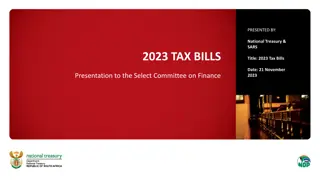
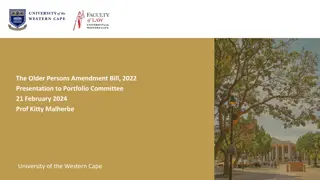
![RE: ELECTORAL MATTERS AMENDMENT BILL [ B42-2023]](/thumb/18837/re-electoral-matters-amendment-bill-b42-2023.jpg)
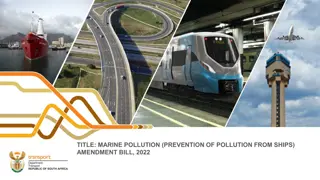
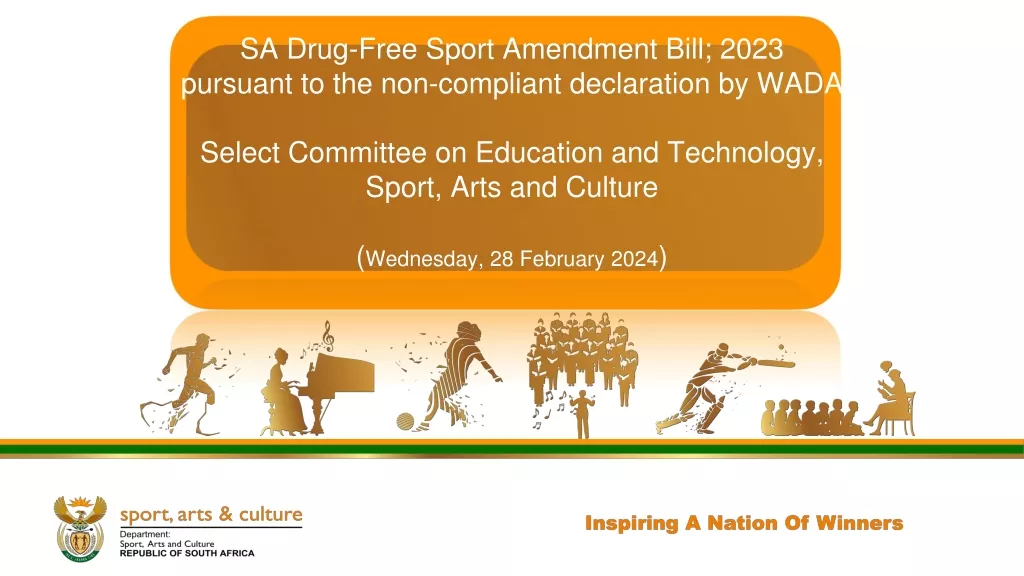

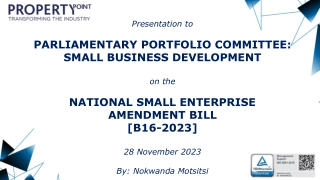
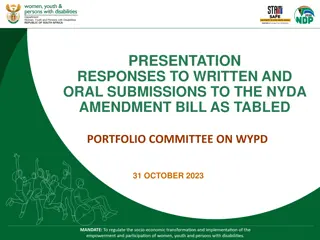
![Enhancing Corporate Transparency: Analysing The Companies Amendment Bill [B27B-2023]](/thumb/60028/enhancing-corporate-transparency-analysing-the-companies-amendment-bill-b27b-2023.jpg)
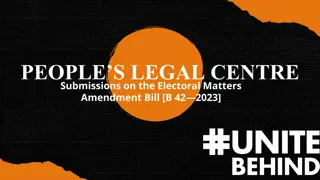
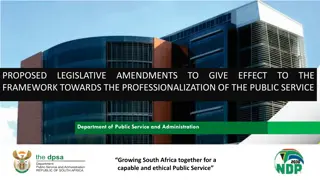
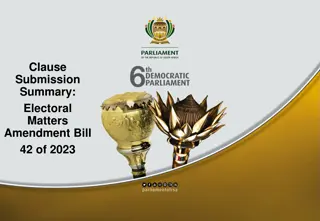
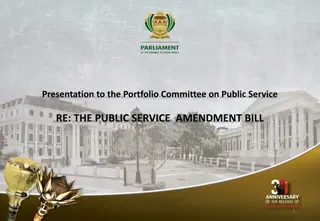
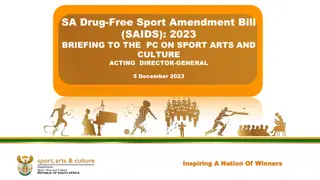
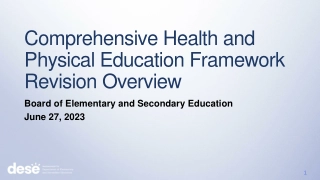
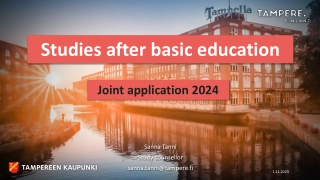
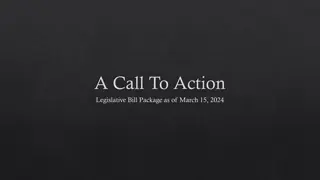
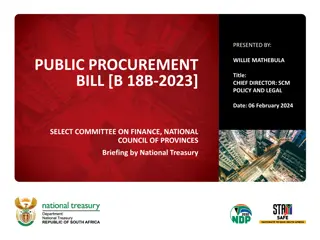
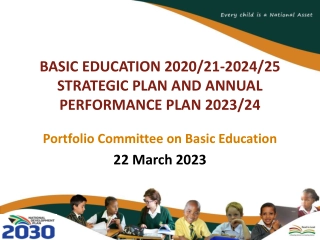
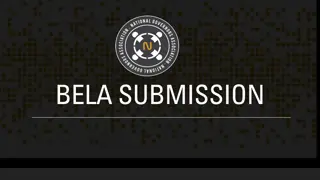
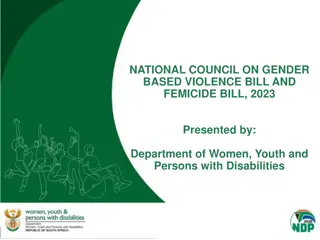
![Stakeholders' Responses to National Health Insurance Bill [B.11B-2019]: Overview](/thumb/69945/stakeholders-responses-to-national-health-insurance-bill-b-11b-2019-overview.jpg)
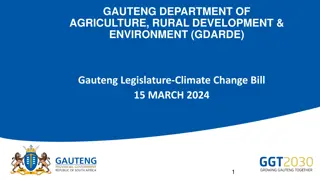
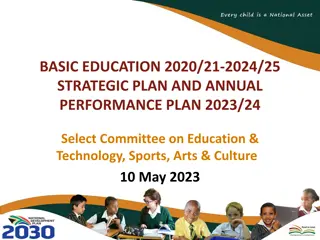

![Prevention and Combating of Hate Crimes and Hate Speech Bill [B.9B.2018]](/thumb/60513/prevention-and-combating-of-hate-crimes-and-hate-speech-bill-b-9b-2018.jpg)
